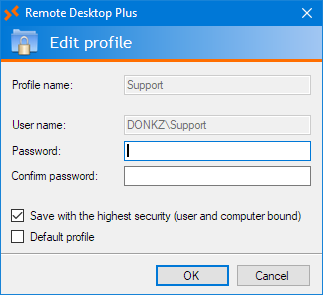You can use the command line tools on this page to help with generating encrypted passwords for use with the /pe command line switch or creating credential profiles.
Gencrypt: Generate encrypted passwords from the command line
This companion tool allows you to generate encrypted passwords in bulk, to be used in conjunction with the /pe command line switch.
Its usage is pretty straightforward:
C:>gencrypt /p:P@sswordExample! Encrypted password: zUAp8pQzKsvnxD4jYxNUKcR1J0H/KTO92ch1x8M8MaNwkAr5ya7PxA==
The output can be piped or redirected to whatever you want. Please note that it has a builtin delay of 2 seconds after each password, to prevent it from being used for a brute force ‘reverse engineering’ of passwords. This shouldn’t be a problem for normal scripted use however.
Starting with version 1.4, you can now also generate the password in the .rdp file hash format instead of the default encrypted format by using the option /hash. You could use this option to generate your own .rdp file for example. Please keep in mind however that – unlike with the encrypted password – the generated hash password only works for the user which ran the command and only on the computer it was generated on.
C:>gencrypt /p:P@sswordExample! /hash password 51:b:01000000D08C9DDF0115D1118C7A00C04FC297EB010000008900A24423398E4EA9EE2994EDDAD7CB0000000002000000000 0106600000001000020000000B87BF10A058F690692221FA0AA4E05DF3D0961A852723EE19E689AAD70DB3DE3000000000E80000000020000 20000000C0359340A4331FBA676660F7ED98179A2B2EB6CD368B8A8AAC2B1EF16302E8DB3000000033A92D5F449479D1D4CC3E41C591ACF64 013C2A7D56A6AE968D28999AE017CE2BB3E794DCFFB2538C304C5304B35FEB540000000AFC52936246CC0D64A9D80EFEEA582DCD07EEA431C 22D85144368B19DCCF40D224E73BE69F46F890228396007EA3ED8327D28399CDA80A3D65467E95C78C88DA
RDPProfile: Create profiles from the command line
You can use the companion tool RDPProfile to create Remote Desktop Plus profiles from the command line. This can be useful if you want to pre-populate some profiles for your end-users.
RDPProfile supports a number of command line switches:
rdpprofile /profile:profilename /u:user [/p[:password] | /pe[:encrypted_password]] [/global] [/default] [/y | /-y]
| /profile:profilename | The name of the profile to create or modify. |
| /u:username | The username to be used for logging in to the specified computer. |
| /p:password | For automatic logon, specify the password for the user. |
| /pe:encrypted_password | Specifies an encrypted password for enhanced security. |
| /global | Save the profile using less strict security (for roaming use). |
| /default | Set the profile as the default profile. |
| /y | Overwrite the profile if it already exists |
| /-y | Do not overwrite the profile if it already exists. |
Example:
C:>rdpprofile /profile:Administrator /u:DONKZAdministrator /pe:azxb7hpAA5Nzn7+HFrfaTA== /global Profile Administrator already exists. Do you want to overwrite it (Y/N)? y Profile created.
Note: If you leave out the password, RDP+ will ask for one the first time the profile is used, even from the command line:

